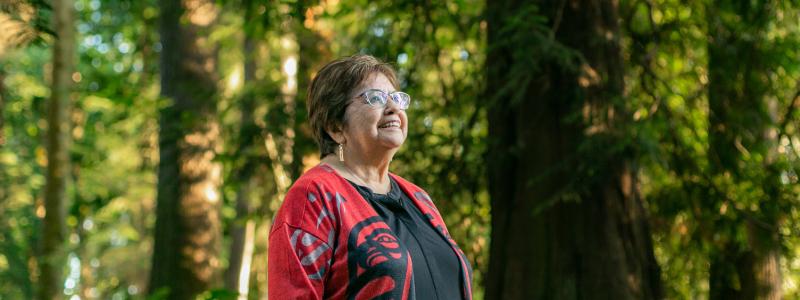As June marks National Indigenous History Month and communities across Canada prepare to celebrate National Indigenous Peoples Day on June 21, we honour the legacy and leadership of Patricia Victor (MA Leadership, ‘12), Switametelót, a respected Stó:lō Elder and member of Xwchíyò:m First Nation.
Patricia Victor Switametelót also serves as Trinity Western University Siyá:m, Co-Director of the Institute of Indigenous Issues & Perspectives, Chair of the Indigenous Partnership Council, a part-time instructor in the School of Education and School of Nursing, and a guiding voice of wisdom and cultural knowledge across campus. Her life is deeply rooted in relationship: with Creator, with family, and with community. Her story reflects a lifelong commitment to reconciliation, education, and Indigenous initiatives.

A journey of reclaiming identity
Victor shared that growing up “non‑status” for five generations shaped her identity profoundly. When she married her husband in 1970, she regained her Indigenous status. “I became a status Indian. Two years ago we had a ceremony that actually reclaimed an ancestral name that my great‑grandmother would have carried,” said Victor.
This formal reclaiming, rooted in protocol and spiritual ceremony, was also healing. “It helped remove the shame and heartbreak that was brought to the women in our family,” said Victor.
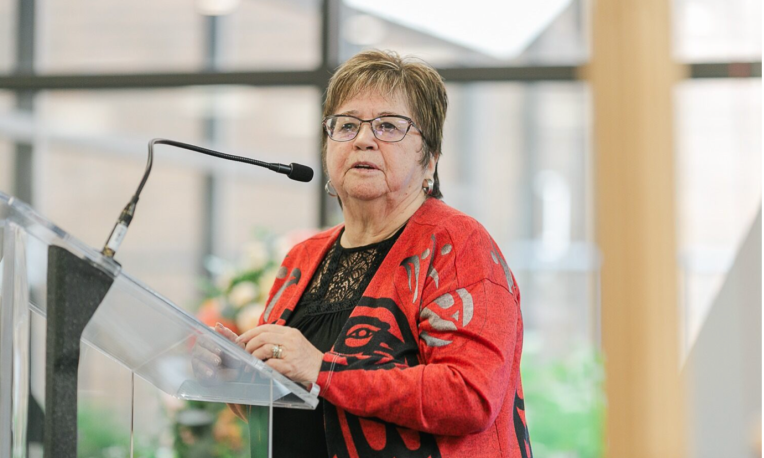
Mother, grandmother, mentor
Reflecting on the many roles she holds, she spoke candidly about the ongoing balance. “In Stó:lō worldview, life isn’t broken into silos. We don’t compartmentalize everything. We’re just us, and this is who we are in the moment,” said Victor.
For Victor, identity is inseparable from relationship. “I’m a mother and a grandmother,” she said, a role she considers foundational to every aspect of her life. With two children and nine grandchildren, family remains central to her worldview: a value deeply rooted in Indigenous culture, where kinship and community are integral to one’s sense of self.
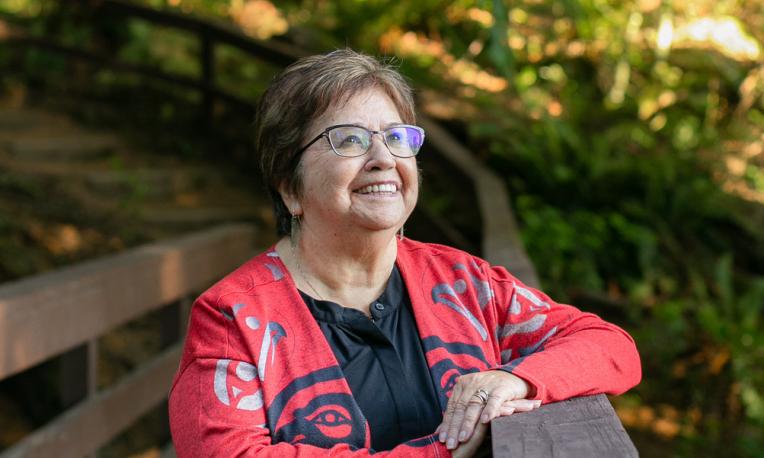
Faith, leadership, ongoing learning
As an alumna, Victor holds an MA in Leadership (‘12) from Trinity Western. For 13 years she served as a part‑time University coordinator for Indigenous inclusion, while ministering as a pastor since 1996.
“What sustains you is vision. That sustaining piece comes from God but also from having a weekly Sabbath. Rest is important,” said Victor.
Since August 2012, Victor has continued to shape Trinity Western’s Indigenous initiatives. In September 2013, during the Truth and Reconciliation Commission hearings in Vancouver, Victor initiated a learning opportunity for students, staff, and faculty to hear Indigenous survivors tell of their experiences at Indian residential schools.
To build good relationships with Indigenous peoples, education is key to transformation of the heart, Victor emphasized. The campus community's on-going efforts to educate across disciplines, research projects that focus on Indigenous matters, land-based experiential learning, and TWU's annual Day of Learning in September bring us closer to the vision of “walking together in a good way,” Victor affirmed. Importantly, strengthening TWU’s recruitment and academic support initiatives for Indigenous students is part of the University's strategic plan, TWU 2030: Every Graduate Equipped.
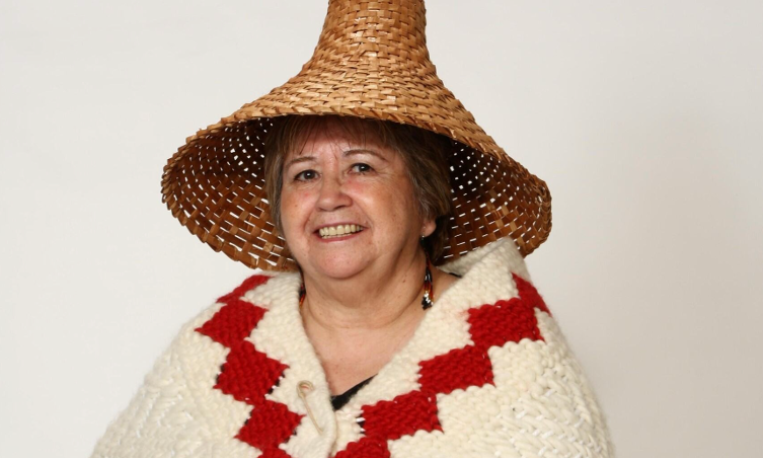
Observing National Indigenous Peoples Day
For Victor, every day is an opportunity to honour Indigenous presence and culture. While June 21 is formally recognized as National Indigenous Peoples Day in Canada, she sees it as more than a single-day event. It’s a space for celebration, storytelling, and collective learning.
Her participation in reconciliation walks speaks to this dual purpose. “We’d stop at specific points, share the history of that place, offer a lament, then continue walking,” said Victor. These acts blend reflection with movement, sorrow with hope. For Victor, the day is both a celebration of culture and an open invitation for others to journey toward understanding and healing.
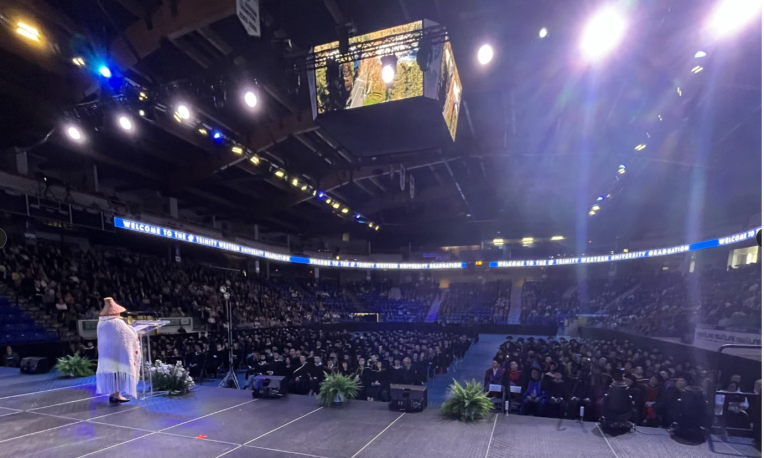
Belonging and building forward
Victor encourages the wider community, including alumni, to move beyond surface-level acknowledgments of Indigenous peoples. “We can have the head knowledge,” she said, “but do we have the heart knowledge to treat everyone right, including Indigenous people?” She points to the changes in British Columbia’s K–12 education system, which has increasingly incorporated Indigenous perspectives into the classroom. “Those graduates are now actively seeking to be part of the work,” she said. To her, that shift signals what’s possible when truth and reconciliation take root not only in policy but in people.
Victor’s vision for the future is one of shared responsibility and hope in God. For her, reconciliation is less about individual recognition and more about nurturing lasting structures that uplift Indigenous leadership and reflect God’s heart for justice, healing, and community. “It’s His work,” she added. “God gets all the glory. I just get to rejoice and join in what He’s doing; and my prayer is that others will join me.”
Because in the end, reconciliation is not merely a goal. As Victor shares, it is a sacred invitation—one that calls each of us to walk humbly, love deeply, and see our place in God’s unfolding story. A story bigger than any one person, yet tender enough to include us all.
Story by Netanya Castillo.
About Indigenous Initiatives at Trinity Western University
At TWU, we seek to hear, understand and acknowledge our shared history with Indigenous peoples and the impact that it continues to have throughout the generations. As a global Christian university, TWU continues to foster greater knowledge and understanding of Indigenous cultures, worldview, and history among students, staff, and faculty. We do this by providing educational opportunities, engaging in community partnerships, and through caring for and supporting Indigenous students. Learn more at TWU's Indigenous Initiatives.
About Trinity Western University
Founded in 1962, Trinity Western University is a global Christian liberal arts university dedicated to equipping students for life. Uniting faith and reason through Christian teaching and scholarship, TWU is a research institution offering undergraduate and graduate degrees in the humanities and sciences as well as in several professional schools. It has campuses in Canada in Langley, Richmond, and Ottawa. Learn more at www.twu.ca or follow us on Instagram @trinitywestern, Twitter @TrinityWestern, on Facebook and LinkedIn. For media inquiries, please contact: media@twu.ca.

